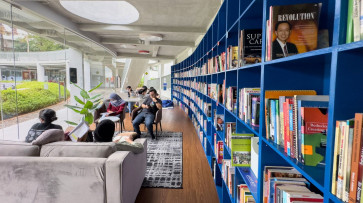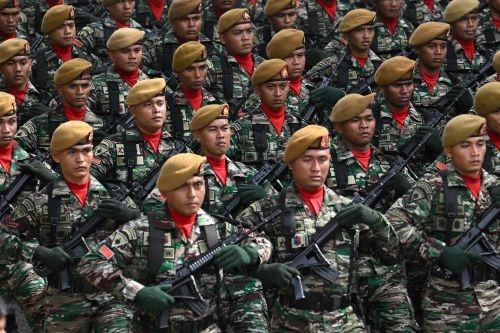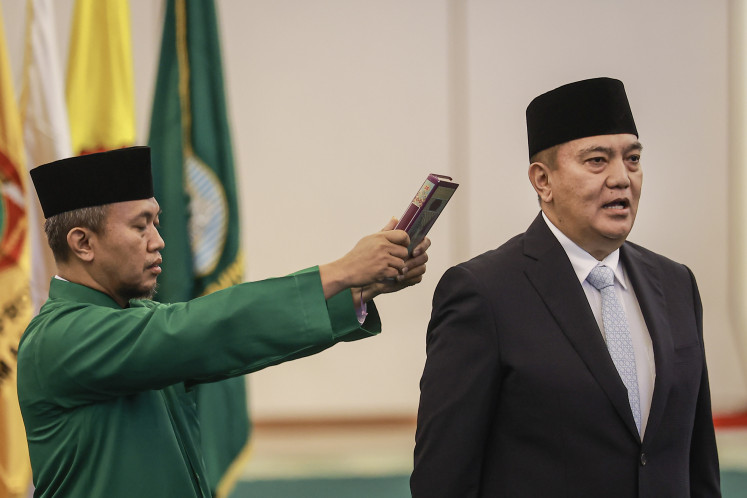Australia and Indonesia: So different yet so close
There are many ways to describe Indonesia-Australia relations, but one fact remains: both countries are neighbors as dictated by geographical reality
Change text size
Gift Premium Articles
to Anyone

T
here are many ways to describe Indonesia-Australia relations, but one fact remains: both countries are neighbors as dictated by geographical reality.
There is nowhere else in the world where there are two countries living next door to one another in which the political, social, economic and cultural differences are so stark.
Much has been said recently about the political and defense strategies of both countries but I feel there is one underlying issue that has been pushed aside and not taken seriously ' the quality of communications between the two countries.
I am referring to quality communications that are able to take into account the cultural framework of both countries, and where, if there is a process of cultural translation and internal reflection in place, then relations could be kept on an even keel.
The current bilateral crisis can be summed up succinctly in a text message doing the rounds in Jakarta at the moment that jokes about the crisis yet captures the essence of the relationship and its problems.
An Australian taps into a conversation of a very senior Indonesian politician, where the Indonesian politician talks about buying 'two kilos of submarines' at Pak Raden's shop in Jakarta. The Australians, according to the joke, went on immediate high alert, surmising that Indonesia was increasing its defense capabilities and that the submarines would be parked at Indonesia's naval base in Surabaya.
The point of the joke is that the Indonesians were talking about a South Sumatran food called 'submarine pempek Palembang', which is a delicious fishcake with an egg inside it, while the Australians interpreted it as real Russian made Kilo-class submarine. The word 'submarine' here has different meanings for both sides and is being used in different contexts.
The joke manages to encapsulate the cultural miscommunication between the countries, reflecting a deep difference not only in culture, but in attitude.
The Indonesian politician in the joke is talking about food sold at Pak Raden's famous shop; and when this is placed in the cultural context, it reflects Indonesia's concern with the basic issues of life and coping with the 250 million people living in this country.
It is in our interests that we focus on the basic needs of life, like fighting poverty and ensuring our education and health standards keep up with the pressures of population growth, especially on the island of Java where the population now exceeds 120 million people.
Meanwhile, the Australian side shows its concerns are all about protecting its strategic interests, and that Indonesia does not have the military capabilities to invade. Australians today do not have to worry about basic needs such as food, education and health.
Instead, the country prefers to be on the lookout at all times, using its sophisticated technological surveillance equipment, such the Jindalee Over-the-Horizon Radar Network (JORN) and many other very sophisticated intercepting systems, to gather information and data on Indonesia.
The point of the Indonesian joke is, what is the use of having all this technological surveillance equipment when some form of cultural and historical understanding does not accompany it?
Cultural insensitivity on the Australian part was reflected in messages on Twitter sent by Mark Textor, who Australian Prime Minister Tony Abbott counts as one of his closest advisers, which said 'Apology demanded from Australia by a bloke who looks like a 1970's Pilipino [sic] porn star and has ethics to match.' (The Sydney Morning Herald, Nov. 23).
At the same time, we in Indonesia tend to forget what it must be like for Australia, sitting down south with only New Zealand and the South Pole for neighbors. Indonesia has 10 times the population of Australia and it is this that lies at the basis of Australia's fears, which led to the historical term the 'yellow peril' and perhaps explains Australia's preoccupation with finding out what Indonesia is up to.
Indonesia must not take it for granted that Australia understands us culturally, as the recent phone tapping drama has shown. This is not helped by the fact that Australia has dramatically reduced its education funds allocated for Australian students learning Indonesian.
The number of Australians able to speak Indonesian today compared to 20 years ago has been greatly reduced because of this Australian government policy.
At the same time, the number of Indonesians learning English has greatly increased in the last twenty years, as more Indonesians want to be part of globalization and English is a prerequisite for this. While this enables many more Indonesians to read about and understand Australia, this is not the case with Australians in relation to understanding Indonesia.
One poignant point is how many Australian journalists today covering Indonesia speak or read Indonesian? There is an imbalance in cultural knowledge and background due to a lack of access to first hand information, not because the Indonesian Military is standing in the way of access, but because less and less Australians have any comprehension or understanding of Indonesian.
Finally it would be useful for Indonesia to remember our independence in 1945 and the two exceptional Australian gentlemen who helped us fight for international recognition through the Good Offices Committee (GOC), Sir Richard Kirby and Tom Critchley.
__________________
The writer, formerly a journalist based in Australia, is secretary-general of the Indonesian Community for Democracy (KID).









